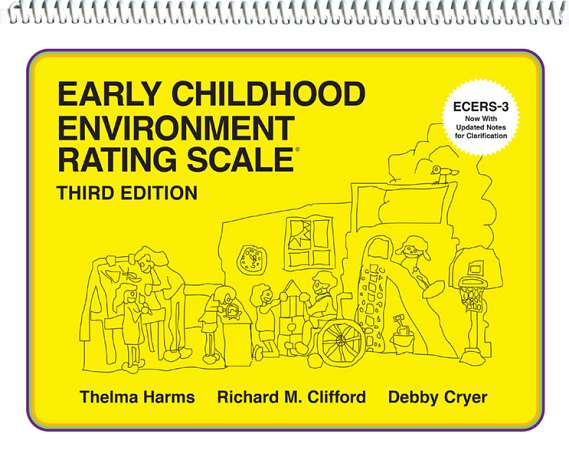Professors: Request an Exam Copy
Print copies available for US orders only. For orders outside the US, see our international distributors.
Third Edition
Thelma Harms, Richard M. Clifford, Debby Cryer
Publication Date: November 1, 2014
Pages: 104

This title is in the Environment Rating Scale® Family of Products—the leading research-based tools to optimize the quality of children’s early learning.
The long-anticipated new version of the internationally recognized Early Childhood Environment Rating Scale®, ECERS-3, focuses on the full range of needs of preschool- and kindergarten-aged children. This widely used, comprehensive assessment tool measures both environmental provisions and teacher–child interactions that affect the broad developmental needs of young children, including cognitive, social-emotional, physical, and health and safety.
ECERS-3 also includes additional Items assessing developmentally appropriate literacy and math activities.
Designed for preschool, kindergarten, and child care classrooms serving children 3 through 5 years of age, ECERS-3:
ECERS-3 is appropriate for state and district-wide QRIS and continuous improvement; program evaluation by directors and supervisors; teacher self-evaluation; monitoring by agency staff; and teacher education. The established reliability and long term evidence of validity of the ERS family of instruments make this new version of ECERS particularly useful for RTTT-ELC accountability and research.
Suitable for use in inclusive and culturally diverse programs, ECERS-3 subscales evaluate:
Thelma Harms, Director of Curriculum Development Emerita, Frank Porter Graham Child Development Institute, University of North Carolina at Chapel Hill.
Dr. Harms is recognized internationally for her work on assessing care and educational programs for children. Her early experience as Head Teacher of the Harold E. Jones Child Study Center, UC Berkeley for 15 years, and her subsequent role as Director of Curriculum Development at the Frank Porter Graham Child Development Institute prepared her to serve as lead co-author of the four Environment Rating Scales (ECERS, ITERS, FCCERS, and SACERS). Much of her recent training and consultation through the Environment Rating Scales Institute (ERSI) has focused on preparing professionals in the use of the scales for research, technical assistance, training, and program assessment in Quality Rating and Improvement Systems (QRIS) and similar quality enhancement projects in the United States and abroad.
Richard M. Clifford, Senior Scientist Emeritus, Frank Porter Graham Child Development Institute, University of North Carolina at Chapel Hill.
Dr. Clifford has written and consulted extensively on child and family policy issues with special emphasis on the role of government in the provision of early childhood services. In addition, he has done research on early learning environments and their impact on young children. He was Principal Investigator on the National Center for Early Development and Learning study of state funded pre-kindergarten programs and Co-Director of the companion SWEEP study. He was also one of the principal investigators on the Cost, Quality and Child Outcomes in Child Care Centers study. He helped establish and served as the first director of the North Carolina Division of Child Development. Dr. Clifford is a past president of the National Association for the Education of Young Children.
Debby Cryer, Scientist Emerita, Frank Porter Graham Child Development Institute, University of North Carolina at Chapel Hill.
Dr. Cryer is now retired from the University and works with the Environment Rating Scales Institute. She was a Principal Investigator for the national study on Cost, Quality and Child Outcomes in Child Care Centers, continued those interests in the European Child Care and Education Study, and has studied the effects of providing continuity of caregiver to infants and toddlers. She is the lead co-author of a curriculum called “All About Preschoolers.” She regularly provides consultation on establishing quality rating and improvement systems. Dr. Cryer frequently lectures, and provides training on the scales, both in the United States and internationally.
“When EC assessment dollars are tight, a comprehensive tool that identifies a broad range of program strengths and captures critical interactions is the perfect solution. Thanks to the authors for ECERS-3!”
—Janice Carter, Arkansas State University, Childhood Services
“The ECERS-3 builds upon the solid foundation of best practice established in the ECERS-R, incorporating the importance of providing a high quality environment with new items and indicators that emphasize the importance of teacher/child interactions within the environment. The ECERS-3 provides a reliable instrument for teachers, technical assistants, and quality monitors to use to assure that children have experiences and relationships that support total child development.”
—Michele Bossers, retired associate director and ERS project manager of PA Key
Endorsement of the ERS Scales:
“The Environment Rating Scales have proven to be an invaluable resource for assessing the quality of child care classrooms. These comprehensive tools truly allow providers to see classrooms through the eyes of the children they care for and the results obtained offer clear feedback that helps teachers improve and grow.”
—Angela Keyes, Assistant Professor of Psychiatry, Tulane University Director, Quality Start Assessment Team of Louisiana
FAQ for ECERS-3
Professors: Request an Exam Copy
Print copies available for US orders only. For orders outside the US, see our international distributors.